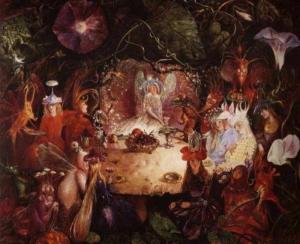The Squire's Daughter: Being the First Book in the Chronicles of the Clintons
Nonfiction, Religion & Spirituality, New Age, History, Fiction & Literature| Author: | Archibald Marshall | ISBN: | 9781465605245 |
| Publisher: | Library of Alexandria | Publication: | March 8, 2015 |
| Imprint: | Language: | English |
| Author: | Archibald Marshall |
| ISBN: | 9781465605245 |
| Publisher: | Library of Alexandria |
| Publication: | March 8, 2015 |
| Imprint: | |
| Language: | English |
The Squire, big, florid, his reddish beard touched with grey falling over the red and gold of his Deputy-Lieutenant's uniform, sat back comfortably beside his wife, who was dressed in pale lavender silk, with diamonds in her smooth, grey-yellow hair. She was short and rather plump. Her grey eyes, looking out on the violet of the night sky, the trees, and the crowd of hilarious onlookers who had not been invited to Buckingham Palace, had a patient and slightly wistful expression. She had not spoken since the carriage had left the quiet hotel in which they were staying for their fortnight in London. Cicely sat on the back seat of the carriage. On such an occasion as this she might have been expected to be accorded the feminine privilege of sitting at the side of her mother, but it had not occurred to the Squire to offer it to her. She was a pretty girl, twenty-two years of age, with a fair skin and abundant brown hair. She was dressed in costly white satin, her gown simply cut. As she had stood before her glass, while her mother's maid had held for her her light evening cloak, her beautiful neck and shoulders had seemed warmly flushed by contrast with the dead pallor of the satin. She also had hardly spoken since they had driven off from their hotel, which was so quiet and private that it was hardly like an hotel, and where some of the servants had stood in the hall to see them get into their carriage, just as they might have done at home at Kencote. It was a great occasion for Cicely. Her brothers—Dick, who was in the Grenadier Guards, and Humphrey, who was in the Foreign Office—were well enough used to the scenes of splendour offered by a London season, but Cicely had hardly ever been in London at all. She had been brought up four years before to be presented, and had been taken home again immediately. She had seen nothing of London gaieties, either then or since. Now she was to enjoy such opportunities of social intercourse as might be open to the daughter of a rich squire who had had all he wanted of town life thirty years before, and had lived in his country house ever since. A fortnight was as long as the Squire cared to be away from Kencote, even in the month of June; and a fortnight was to be the extent of Cicely's London season. This was to be the crowning night of it. The Squire chattered on affably. He had had a good dinner and had not been hurried over it, or afterwards. That was the worst of those theatres, he would say; they didn't give you time even to drink your glass of wine; and he had not been affable with his wife and daughter the evening before, when driving to the play. But now he was rather pleased with himself. He did not care for all this sort of thing, of course; he had had quite enough of it as a subaltern, dancing about London all night, and going everywhere—all very well for a young fellow, but you got tired of it. Still, there was a certain flavour about a Court Ball, even for a one-time subaltern in the Blues, who had taken part in everything that was going on. Other people scrambled for such things—they had to if they wanted them, and why they should want them if they didn't come to them naturally, the Squire couldn't tell. To a man of the importance of Edward Clinton of Kencote, they came as a matter of course, and he accepted them as his due, but was pleased, too, at having his social importance recognised in such a way, without his stirring a finger. As a matter of cold fact, a finger had been stirred to procure this particular honour, although it had not been his. But of that he was not aware.
The Squire, big, florid, his reddish beard touched with grey falling over the red and gold of his Deputy-Lieutenant's uniform, sat back comfortably beside his wife, who was dressed in pale lavender silk, with diamonds in her smooth, grey-yellow hair. She was short and rather plump. Her grey eyes, looking out on the violet of the night sky, the trees, and the crowd of hilarious onlookers who had not been invited to Buckingham Palace, had a patient and slightly wistful expression. She had not spoken since the carriage had left the quiet hotel in which they were staying for their fortnight in London. Cicely sat on the back seat of the carriage. On such an occasion as this she might have been expected to be accorded the feminine privilege of sitting at the side of her mother, but it had not occurred to the Squire to offer it to her. She was a pretty girl, twenty-two years of age, with a fair skin and abundant brown hair. She was dressed in costly white satin, her gown simply cut. As she had stood before her glass, while her mother's maid had held for her her light evening cloak, her beautiful neck and shoulders had seemed warmly flushed by contrast with the dead pallor of the satin. She also had hardly spoken since they had driven off from their hotel, which was so quiet and private that it was hardly like an hotel, and where some of the servants had stood in the hall to see them get into their carriage, just as they might have done at home at Kencote. It was a great occasion for Cicely. Her brothers—Dick, who was in the Grenadier Guards, and Humphrey, who was in the Foreign Office—were well enough used to the scenes of splendour offered by a London season, but Cicely had hardly ever been in London at all. She had been brought up four years before to be presented, and had been taken home again immediately. She had seen nothing of London gaieties, either then or since. Now she was to enjoy such opportunities of social intercourse as might be open to the daughter of a rich squire who had had all he wanted of town life thirty years before, and had lived in his country house ever since. A fortnight was as long as the Squire cared to be away from Kencote, even in the month of June; and a fortnight was to be the extent of Cicely's London season. This was to be the crowning night of it. The Squire chattered on affably. He had had a good dinner and had not been hurried over it, or afterwards. That was the worst of those theatres, he would say; they didn't give you time even to drink your glass of wine; and he had not been affable with his wife and daughter the evening before, when driving to the play. But now he was rather pleased with himself. He did not care for all this sort of thing, of course; he had had quite enough of it as a subaltern, dancing about London all night, and going everywhere—all very well for a young fellow, but you got tired of it. Still, there was a certain flavour about a Court Ball, even for a one-time subaltern in the Blues, who had taken part in everything that was going on. Other people scrambled for such things—they had to if they wanted them, and why they should want them if they didn't come to them naturally, the Squire couldn't tell. To a man of the importance of Edward Clinton of Kencote, they came as a matter of course, and he accepted them as his due, but was pleased, too, at having his social importance recognised in such a way, without his stirring a finger. As a matter of cold fact, a finger had been stirred to procure this particular honour, although it had not been his. But of that he was not aware.















